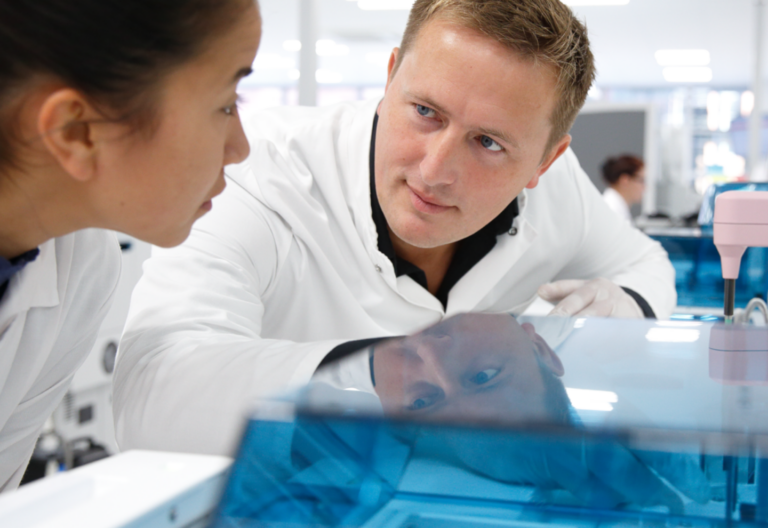At a glance
- When Anna, an experienced executive, became general manager at Roche Diagnostics Belgium (RDB), this seemed like a classic appointment to steer continued success.
- RDB had a reputation as a successful organization, but all was not as it seemed and Anna soon perceived that there was room for improvement to address: The recent loss of a long-standing customer, insufficient business processes and reviews and employee engagement.
- The organization was shocked when, after just nine months, Anna announced a transformation program focused on culture, customers and a move to digital.
- Anna’s personal courage to disrupt the prevailing narrative of success at RDB offers inspiration for leaders in navigating sensemaking and cultural transformation.
How to lead change in a successful business that does not perceive the need to transform?
Roche Diagnostics is the market leader in the in-vitro diagnostics business and the largest provider of test results empowering doctors and patients to make informed decisions about healthcare. Medical diagnostics support evidence-based clinical decisions through screening, diagnosis, treatment and monitoring of disease. These diagnostics are “the silent champion” of healthcare, influencing over 60% of clinical decision making, yet accounting for only 2–3% of the total healthcare spend. In 2017, Roche Diagnostics Belgium (RDB) was an organization with a solid reputation for success within Roche’s European region, based on a strong position as market leader, state-of-the-art products and a leadership team with many years of experience.
THE BROADER ISSUE
Like many global companies, Roche Diagnostics has a practice of rotating leaders between new roles and countries to develop individual and organizational leadership. This gives individual leaders the opportunity to hone their leadership skills when faced with new environments and increasingly complex challenges, while building leadership talent within the organization. Although this approach to leadership development makes sense, it is not without its challenges, especially as transitions become increasingly complex when individuals move to a new business and/or country, which increases the learning curve.
As our colleague Michael Watkins makes clear, navigating the first 90 days in a new role is essential to leading successfully.[1] Yet there are many factors at play in this navigational phase: understanding the business and its financial, strategic and organizational health; understanding customers and their experience; and understanding the people and the culture. For this learning phase to be effective, leaders in new roles need an openness in the organization so they can understand how it operates and how best to lead. It is not clear how leaders make sense of the situation they inherit and lead when this support is limited or absent.
CHANGING A WINNING FORMULA?
When Anna-Maria Heuchel-Reinig (Anna) was appointed general manager at RDB in 2017, it seemed like a good match. She was a seasoned executive who had led in different geographies and businesses, and the Belgian organization had an excellent reputation for success, having grown continually over the last 10 years. However, Anna grew increasingly puzzled during her first 90 days on the job by the cool reception she received from the leadership team and the discrepancy between the organizational narrative of a well-run business and her own observations about a company in need of review. She was told that she should not concern herself with too many details as the leadership team had things under control, and she was given the distinct impression that she was surplus to requirements. Her disquiet grew as her requests to access people and information to make her own mind up about the health of the organization were ignored.
Following a much-needed holiday, Anna returned to work to hear corridor rumors that members of the leadership team were against her planned corporate-wide “back-to-business” meeting, at which she intended to share her observations from her first four months as general manager and have an honest discussion to motivate the whole company. Anna considered her options for handling the situation and made a swift decision that was to set the tone for subsequent actions.
To the surprise of many in the company, Anna demoted the perpetrator of the gossip from the leadership team, sending a clear message that she expected professional behavior and open dialogue.
CULTURAL AND DIGITAL TRANSFORMATION AT RDB
The year 2018 heralded significant change as Anna concluded that a substantial shift in the organization’s culture and leadership was essential for it to maintain its previous success. In January 2018, she took the organization for an off-site meeting to a disused mine. The physical setting was a strong metaphor to underscore the importance of change and reinforced Anna’s words that proactive change was necessary.
Acknowledging the solid financial ground of the company, Anna highlighted how RDB risked decline unless it took customer concerns and employee satisfaction seriously. She initiated both a cultural transformation – focused on clarity, customer centricity and a welcoming professional culture – and a digital business transformation. This shift was initially met with disbelief, especially from the leadership team and those who believed the success story of the company.
Although many were surprised at the extent of the changes that Anna introduced, others were relieved she was taking the recent loss of a major customer seriously, as the Belgian healthcare market was consolidating from many small regional hospitals to about 25 hospital networks. Responding to this consolidation in the Belgian healthcare market and increasing patient empowerment, Anna focused attention on understanding customers’ expectations to address how the company could become more customer centric. This resulted in greater integration and understanding between customer support and sales within the company to present customers with an integrated relationship.
Anna made a series of decisions that would have a major impact on the company. Despite RDB’s success, in an unusual move, she requested an audit from Roche corporate headquarters to review the state of the subsidiary. The audit highlighted the need for a significant change in mindset.
Anna realized that maintaining RDB’s success would require the adoption of a growth mindset to develop the habit of curiosity to build understanding. She hand-picked a team comprising select members of the leadership and people from different parts of the organization to identify how to introduce a change in mindset and develop a more agile organization. They came up with the “triple D” motto – dare, decide and do – to signify that people needed to dare to question, decide on action and then make things happen. This motto was to symbolize the authorization of ideas followed by implementation by all people in the organization. Triple D was central to the culture of becoming more agile and customer focused.
In parallel, she instigated leadership development initiatives to build the skills and cohesion of the team. Starting with 360-degree assessments of the individual competencies and health of the team overall, she made clear her expectations to drive culture change through a focus on three priorities: clarity, professionalism and a welcoming culture. These priorities were to drive greater engagement within the organization by creating a culture in which each person was clear about the expectations about their role and RDB’s professional standards. The welcoming culture aimed to foster an environment based on curiosity to explore how people could adopt an open and growth mindset.
DID IT WORK?
Anna’s assessment that the organization needed to change was correct, and her leadership established a more engaged organization that was able to respond to the shifting dynamics in the Belgian healthcare market. Anna initiated regular leadership development touch points to establish clear expectations among the team and honest dialogue. These conversations were vital to signal the need to shift to a more effective interaction among members of the leadership team in a spirit of collaboration Those leaders who were resistant or incapable of changing to more agile and collaborative ways of working were replaced. This sent a clear message that a cultural and digital transformation needs the energy and commitment of all to establish a psychologically safe place in which everyone can contribute to a virtuous cycle of continuous improvement.
The January 2019 annual kick-off meeting was held in a cinema – a perfect metaphor for the intense work that had taken place in RDB the previous year. The location of the cinema symbolized how much work is done behind the scenes to produce a great movie. Roles are cast, expectations are clarified, dialogue practiced and honed, the environment created and multiple production teams coordinated to bring these diverse talents together as an ensemble that is so much greater than its parts. Anna sent the clear message that RDB had risen to the challenge of transformation. Not only did the company improve customer satisfaction, employee engagement and financial results but it did so in a year of significant cultural transformation. All the work “behind the scenes” had established a solid foundation for the next stage – the sequel.
And what of the digital transformation? The cultural transformation laid the ground for the adoption of digitalized ways of working that would enable RDB to shine through 2019. In May 2019 RDB and GE launched a digital collaboration product, Navify® Tumor Board, to enable more personalized treatment in cancer care. And in September, agreements were signed with innovation partners to focus on the digital transformation of healthcare to reinforce Roche’s purpose of doing now what patients need next.
From her questioning whether to change a winning formula on taking up her new role in 2017 and her subsequent actions, Anna’s leadership initiated a cultural and digital transformation that positioned RDB for the future. The company continues to raise the bar by enhancing its ways of working and pursuing the adoption of digital technology to enable its partners to be at the forefront of healthcare transformation.
TAKEAWAYS
Business executives can learn about managing leadership transitions, sensemaking and change management from the experience of RDB. Specifically:
- Managing the first 90 days in a new role. This includes the balance between learning and doing, diagnosing the leadership team and culture, and establishing relationships within the organization.
- Making sense of a novel leadership situation even when the environment is not welcoming. Sensemaking is most effective when it is a shared endeavor. It can be a messy process that involves obtaining data from multiple people and sources, being open to new ways of seeing and the ability to hold an experimental mindset.
- Sensemaking as a prerequisite for learning, change and other leadership behaviors like vision and relatedness. Attention to this foundational capability is often overlooked in the development of leadership. It is vital to notice discrepancies in the prevailing narrative and be prepared to challenge that perspective.
- Courage is required to introduce and sustain cultural and digital change within a successful organization: Courage to disrupt the narrative of success; courage to make decisions that change processes, people and culture; and courage to persist when doubts and resistance emerge.
“Digital transformation is about changing the way we, our customers and our partners in healthcare consume, analyze and use information. It is changing the way that people make choices, the way we conduct business and the way the healthcare sector operates in this fast-changing environment.”
Anna-Maria Heuchel-Reinig, General Manager, Roche Diagnostics Belgium
[1] Watkins, Michael D.. The First 90 Days. Harvard Business Review Press, 2012.
Research Information & Knowledge Hub for additional information on IMD publications
Research Information & Knowledge Hub for additional information on IMD publications






